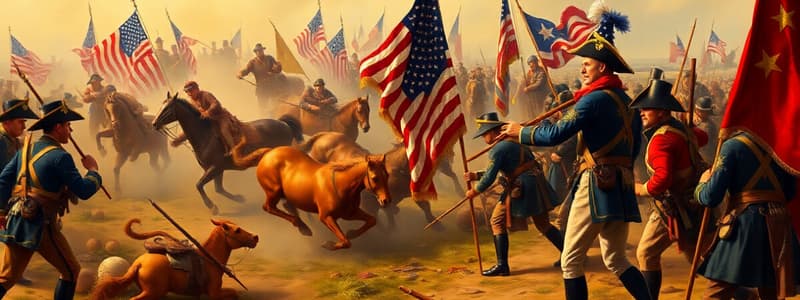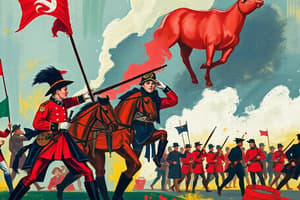Podcast
Questions and Answers
What was the main reason for the War of 1812?
What was the main reason for the War of 1812?
- Disagreements over trade and impressment of sailors (correct)
- The American desire to expand westward
- Territorial disputes over the Louisiana Purchase
- British support for Native American tribes
The War of 1812 was fought only on American soil.
The War of 1812 was fought only on American soil.
False (B)
The War of 1812 ended with a new spirit of ______ in the United States.
The War of 1812 ended with a new spirit of ______ in the United States.
nationalism
Match the following battles with their respective outcomes:
Match the following battles with their respective outcomes:
General William Henry Harrison's military campaign to conquer Canada was successful.
General William Henry Harrison's military campaign to conquer Canada was successful.
What was the name of the commander of the Lake Erie naval forces?
What was the name of the commander of the Lake Erie naval forces?
The death of Tecumseh in 1813 marked the beginning of a Native American confederation.
The death of Tecumseh in 1813 marked the beginning of a Native American confederation.
What was the nickname given to the American frigate, the Constitution, after a British cannonball bounced off its hull during a battle?
What was the nickname given to the American frigate, the Constitution, after a British cannonball bounced off its hull during a battle?
What was the name of the Tennessee planter who attacked the Creeks in March 1814?
What was the name of the Tennessee planter who attacked the Creeks in March 1814?
The Battle of Horseshoe Bend in August 1814 resulted in the defeat of the ______ and forced them to cede most of their lands to the United States.
The Battle of Horseshoe Bend in August 1814 resulted in the defeat of the ______ and forced them to cede most of their lands to the United States.
Match the following terms with their definitions:
Match the following terms with their definitions:
Which of the following was NOT a reason for the American victories at sea during the War of 1812?
Which of the following was NOT a reason for the American victories at sea during the War of 1812?
The Battle of Thames resulted in a British victory.
The Battle of Thames resulted in a British victory.
Why did the Federalist Party lose support after the War of 1812?
Why did the Federalist Party lose support after the War of 1812?
The Treaty of Ghent resolved all major issues between the United States and Britain.
The Treaty of Ghent resolved all major issues between the United States and Britain.
Match the following individuals with their roles in the War of 1812:
Match the following individuals with their roles in the War of 1812:
The British forces won the Battle of Plattsburgh.
The British forces won the Battle of Plattsburgh.
Flashcards
War of 1812
War of 1812
Conflict between the United States and Britain from 1812 to 1815.
Battle of Lake Erie
Battle of Lake Erie
A naval battle where American forces defeated the British navy in 1813.
Burning of Washington, D.C.
Burning of Washington, D.C.
In 1814, British forces set fire to several government buildings in Washington, D.C.
Andrew Jackson
Andrew Jackson
Signup and view all the flashcards
Nationalism
Nationalism
Signup and view all the flashcards
Battle of York
Battle of York
Signup and view all the flashcards
Lake Erie Control
Lake Erie Control
Signup and view all the flashcards
Oliver Hazard Perry
Oliver Hazard Perry
Signup and view all the flashcards
Constitution Frigate
Constitution Frigate
Signup and view all the flashcards
Perry's Victory Message
Perry's Victory Message
Signup and view all the flashcards
American Privateers
American Privateers
Signup and view all the flashcards
Political Cartoons
Political Cartoons
Signup and view all the flashcards
Symbolism of Brother Jonathan
Symbolism of Brother Jonathan
Signup and view all the flashcards
Battle of Thames
Battle of Thames
Signup and view all the flashcards
British burn Washington D.C.
British burn Washington D.C.
Signup and view all the flashcards
Fort McHenry
Fort McHenry
Signup and view all the flashcards
Battle of Lake Champlain
Battle of Lake Champlain
Signup and view all the flashcards
Battle of New Orleans
Battle of New Orleans
Signup and view all the flashcards
Native American forces
Native American forces
Signup and view all the flashcards
British naval blockade
British naval blockade
Signup and view all the flashcards
American resistance
American resistance
Signup and view all the flashcards
Treaty of Ghent
Treaty of Ghent
Signup and view all the flashcards
Federalist Party
Federalist Party
Signup and view all the flashcards
Privateer
Privateer
Signup and view all the flashcards
Frigate
Frigate
Signup and view all the flashcards
War of 1812 effects
War of 1812 effects
Signup and view all the flashcards
Perry's victory
Perry's victory
Signup and view all the flashcards
Public confidence post-war
Public confidence post-war
Signup and view all the flashcards
Dolley Madison
Dolley Madison
Signup and view all the flashcards
Plattsburgh
Plattsburgh
Signup and view all the flashcards
British Navy
British Navy
Signup and view all the flashcards
Yellow Fever Epidemic
Yellow Fever Epidemic
Signup and view all the flashcards
Burning of Washington
Burning of Washington
Signup and view all the flashcards
James Madison
James Madison
Signup and view all the flashcards
John Bull
John Bull
Signup and view all the flashcards
Brother Jonathan
Brother Jonathan
Signup and view all the flashcards
Tecumseh
Tecumseh
Signup and view all the flashcards
Battle of Horseshoe Bend
Battle of Horseshoe Bend
Signup and view all the flashcards
British Offensive
British Offensive
Signup and view all the flashcards
Creeks
Creeks
Signup and view all the flashcards
Washington D.C. attack
Washington D.C. attack
Signup and view all the flashcards
Study Notes
The War of 1812
- The war between the United States and Britain began in 1812
- Fighting took place in the US, Canada, and at sea
- Key terms: frigate, privateer
- The War of 1812 involved naval battles and land battles
- The British burned Washington, D.C. in 1814.
- American forces won the Battle of New Orleans in January 1815, even though the war was officially over.
- The war ended with the Treaty of Ghent in December 1814.
- The war led to a new spirit of nationalism in the US.
War Begins
- The War Hawks in Congress encouraged the war
- Americans underestimated the strength of the British and their Native American allies
- The US Army was small, poorly trained, and lacked leadership.
Naval Battles
- Oliver Hazard Perry defeated the British on Lake Erie in 1813
- This victory allowed American forces to take control of the Great Lakes
- Numerous American privateers (private armed ships) successfully attacked British ships.
Setbacks for Native Americans
- Tecumseh's death in 1813 ended hopes for a unified Native American confederation
- Andrew Jackson's forces defeated the Creeks at the Battle of Horseshoe Bend in 1814, weakening Native American resistance
The British Offensive
- The British, victorious in Europe, sent more troops to America in 1814
- The British burned Washington, D.C
- The British were defeated at the Battle of Lake Champlain
Baltimore Holds Firm
- The British attacked Baltimore in September 1814
- The British were stopped by the American troops at Fort McHenry, inspiring Francis Scott Key to write "The Star-Spangled Banner"
Defeat at Plattsburgh
- A British invasion of New York State was halted by the American naval victory on Lake Champlain
- This defeat convinced the British that further fighting in North America was too costly.
The War Ends
- The Treaty of Ghent, signed in Belgium in December 1814, ended the war
- The treaty didn't change any borders and did not address the issues that had started the war.
American Nationalism
- After the war, Americans felt a strong sense of national pride and unity
- The Federalist Party lost support due to their opposition to the war.
Battle of New Orleans
- Andrew Jackson led American forces to a decisive victory against the British at New Orleans in January 1815, after the war was officially over.
- This victory boosted American morale significantly.
Studying That Suits You
Use AI to generate personalized quizzes and flashcards to suit your learning preferences.




